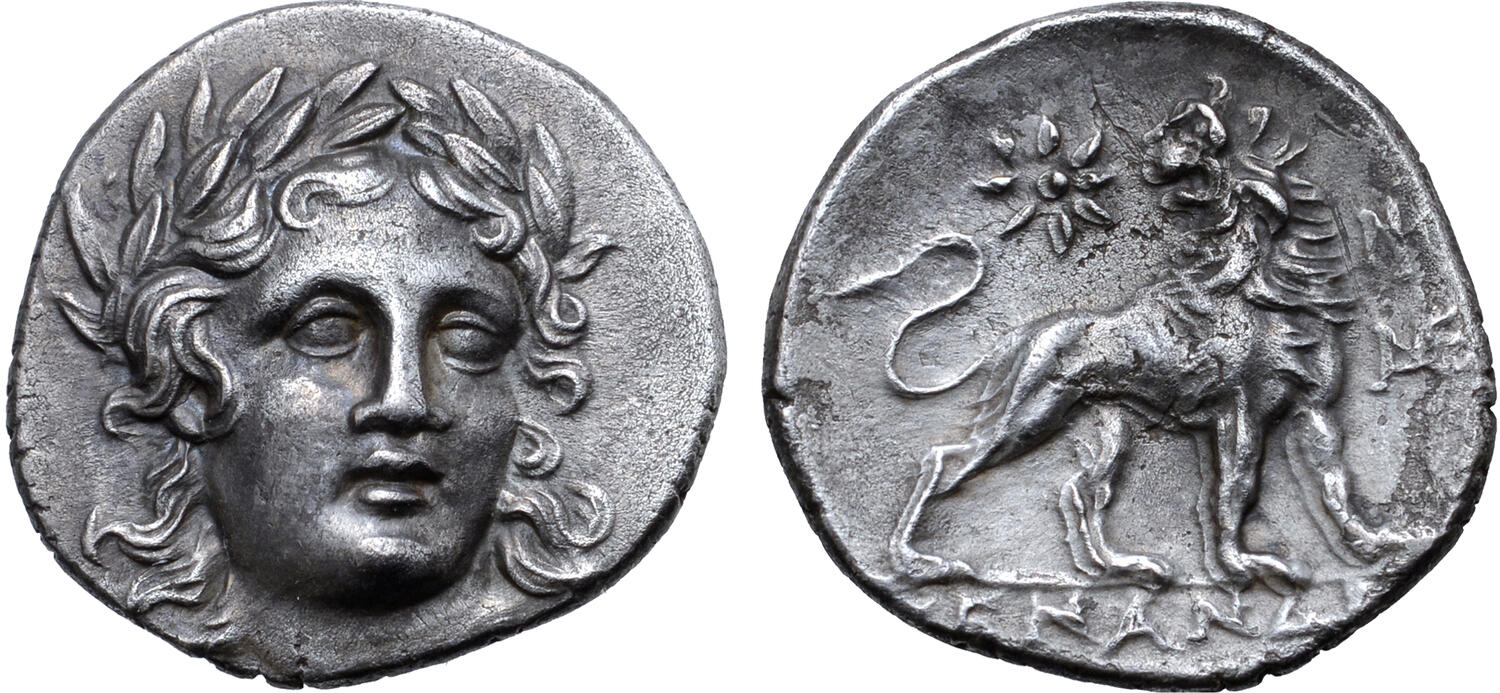S 342 - Miletus, silver, drachma, 200-190 BC
From SILVER
200 BCE - 190 BCE Silver 777 kg
Description
| ObverseInscription or printing placed on the obverse.: | Head of Apollo left or right, wearing laurel wreath. |
| ReverseInscription or printing placed on the reverse.: | monogram of the city (Greek).Lion left or right, head reverted, above, a star. In the field, name and monogram. |
Mint and issuing power
| MintIdentifies the place of manufacture or issue of a numismatic object.: | Miletus | Ancient regionAncient region.: | Ionia | Modern countryModern country: Turkey | AuthorityIdentifies the issuing power. The authority can be "pretended" when the name or the portrait of X is on the coin but he/she was not the issuing power. It can also be "uncertain" when there is no mention of X on the coin but he/she was the issuing power according to the historical sources: |
Chronology
| FromIdentifies the initial date in a range assigned in a numismatic context. | 200 BCE | toIdentifies the final date in a range assigned in a numismatic context.. | 190 BCE | PeriodTime period of the numismatic object.: Hellenistic 323-30 BC |
Physical description
| MetalThe physical material (usually metal) from which an object is made.: | Silver |
Median weightMedian of the weights of numismatic objects (in grams). in grams | 5.00 | DenominationTerm indicating the value of a numismatic object. Examples: tetradrachm, chalkous, denarius.: | drachma |
StandardStandard.: |
Image

S_342_-_Miletus,_silver,_drachma,_200-190_BC.jpg [1]
References
| Die study referencePublication of the study: | Kinns 19981Kinns 1998, p. 175-195, pl. 38-46 (catalog p. 183-195, drachmas of the phase I). | ||
| Coin series referenceReference to coin series study: | |||
Obverse dies distribution
| FrequencyFrequency of specimen in distribution. ᵖ | Number of obversesNumber of obverse dies. ᵖ (o) | % (o) | Number of coinsNumber of coins. (n) | % (n) | Die nameName(s) of the die(s). |
| 1 | 2 | 28.57 | 2 | 5.71 | O6, O11 |
| 2 | 1 | 14.29 | 2 | 5.71 | O9 |
| 3 | 1 | 14.29 | 3 | 8.57 | O3 |
| 6 | 1 | 14.29 | 6 | 17.14 | O7 |
| 8 | 1 | 14.29 | 8 | 22.86 | O10 |
| 14 | 1 | 14.29 | 14 | 40 | O8 |
| Total | 7 of 7 | 100.02 | 35 of 35 | 99.99 |
Reverse dies distribution
no distribution is available
Quantification
| Number of obversesNumber of obverse dies. ᵖ (o) | 7 | Number of singletons (o1)The number of singleton coins. ᵖ | 2 |
| Number of reverse diesNumber of reverse dies. (r) | 13 | Number of coinsNumber of coins. (n) | 35 |
| Coins per obverse dieNumber of coins per obverse die. (n/o) | 5 | Coins per reverse dieNumber of coins per reverse die. (n/r) | 2.69 |
| Reverse per obverse ratioRatio of obverse dies divided by reverse dies. (r/o) | 1.86 | Percentage of singletons (o1)number of coins (n) divided by the number of singletons (o1) ᵖ | 28.57 % |
| Original number of dies (O) (Carter 1983 formula)The estimation of the number of coins according to Carter 1983 ᵖ | 7.77 | Coins struck if 20,000 as average productivity per dieCoins made if the average productivity for obverses (according to Carter) is 20,000. ᵖ | 155,400 |
| Original number of dies (O) (Esty 2011 formula)The estimation of the number of coins according to the singleton formula in Esty 2011 ᵖ (O) | 8.75 | Survival rate if 20,000 as average productivity per dieSurvival rate if average productivity is 20,000. ᵖ | 0.00023 |
| Coverage (o = % of O) (Esty 1984 formula)Esty 1984 - coverage (% of O) ᵖ (o = % of O) | 94.29% | Die productivity if survival rate 1/2,000Average productivity if survival rate is 1/2,000. ᵖ | 9,009.01 |
| Weight of silver (in kg) if 20,000 coins per die (O = Carter formula)Carter 1983 * Median weight * 20000 (*10 if gold or electrum) ᵖ | 777 kg <br /> 777 kg | Die productivity if survival rate 1/5,000Average productivity if survival rate is 1/5,000. ᵖ | 22,522.52 |
Remarks
References
- ^ Kinns, Philip (1998), "CH 8, 474: Milesian Silver Coinage in the Second Century BC", in Richard Ashton and Silvia Hurter (eds.), Studies in Greek Numismatics in Memory of Martin Jessop Price, London, p. 175-195, pl. 38-46.